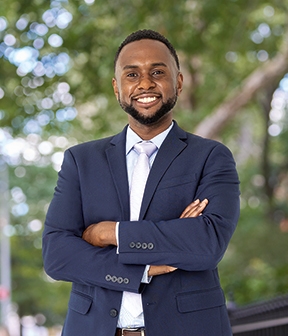Appellate Advocacy
Daniel Harawa, a former public defender and civil rights litigator, focuses his research on how to remedy racial bias in the justice system.
Daniel Harawa started his legal career as a public defender, and then worked as a civil litigator for the NAACP Legal Defense and Educational Fund (LDF). “I loved my work, and I love the practice of law,” Harawa says. But he also wanted to have a broader impact. “In being a practitioner—only a practitioner—I was seeing the same systemic problems over and over again, and felt like I didn’t have the ability to voice my frustrations,” he says.
Shifting his focus toward research and the education of future lawyers, Harawa moved to the faculty of Washington University School of Law as an associate professor and director of the yearlong Appellate Clinic in 2019. In summer 2023, Harawa joined the faculty of NYU Law as an associate professor of clinical law.
A Washington, DC, native, Harawa holds a BA in sociology and American studies from the University of Richmond—where he took as many classes on the sociology of criminal justice as he could—and a JD from Georgetown University. After working as an appellate staff attorney at the Public Defender Service for the District of Columbia, Harawa became a civil rights attorney at LDF, specializing in criminal justice reform and appellate advocacy.
Harawa focuses in his research on race and the criminal legal system, particularly studying how doctrine, institutional design, and litigation practice contribute to the subordination of people of color. His scholarship has appeared in the California Law Review, Georgetown Law Journal, and Georgia Law Review, among other journals. In the 2022 paper “Lemonade: A Racial Justice Reframing of the Roberts Court’s Criminal Jurisprudence,” Harawa scrutinizes the Supreme Court’s recent criminal jurisprudence to find ways to use this case law to advance racial justice. His forthcoming article “Whitewashing the Fourth Amendment” underscores the need to reevaluate how attorneys choose to address or ignore race.
“Because I have worked as both a public defender and a racial justice lawyer,” says Harawa, “a lot of my research focuses on how we ameliorate racial bias in the criminal legal system: pointing out where the bias is, thinking about how lawyers may perpetuate biases, and then figuring out how to mitigate or fix that. That line of thinking is different from that of most scholars—most focus on the courts, whereas in many ways I think about the profession. This research is based on what I’ve seen in real life, with real clients, using them as inspiration to envision a criminal legal system that is more fair and just.”
At Washington University, Harawa’s clinic students took on habeas corpus and civil rights appeals in federal appellate courts, garnering judges’ commendations for their work in three published opinions: Tate v. Harmon, Mejia v. Pfister, and Dix v. Edelman Financial Services. As a visiting professor at NYU Law last fall, Harawa taught the Federal Appellate Clinic, which accepts appointments from federal courts of appeals to represent indigent clients in their criminal, habeas, and civil rights appeals. He says he was thrilled to work with NYU Law students. “Their dedication, their intelligence, and the training that they had by the time that they had reached their third year of law school just made them incredible to work with,” Harawa says. After a yearlong sabbatical, he will resume instruction of the Federal Appellate Clinic in academic year 2024–25.
“Daniel is an outstanding and visionary teacher, scholar, and advocate,” says Deborah Archer, associate dean for experiential education and clinical programs. “He is a leader in both the clinical and civil rights communities, and we are beyond excited for him to join our clinical law program.”
Now, Harawa is enthusiastic about continuing his work at NYU. “[The NYU Law clinical program has] been at the forefront of clinical legal education and thinking about innovative services in the legal profession,” he says. “I’m so proud to be a part of this amazing program with amazing colleagues.”
Photo credit: JJ Lane. Posted September 11, 2023


